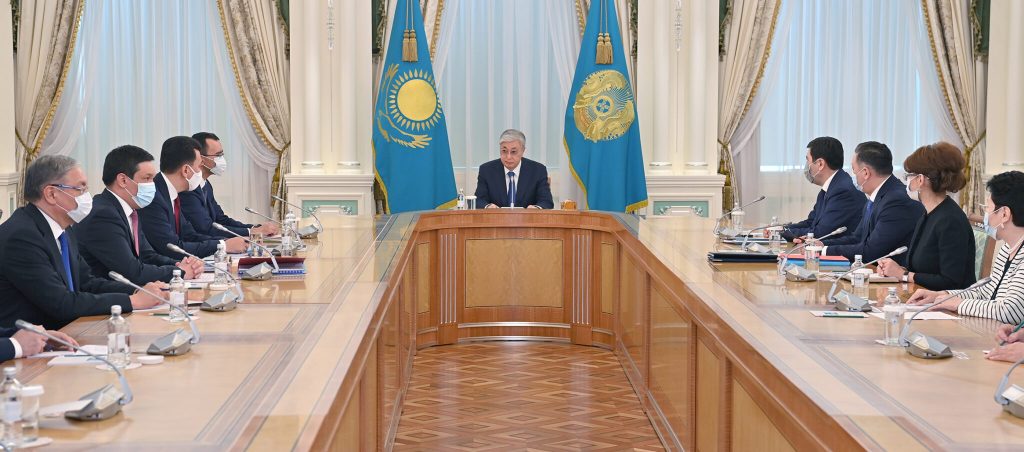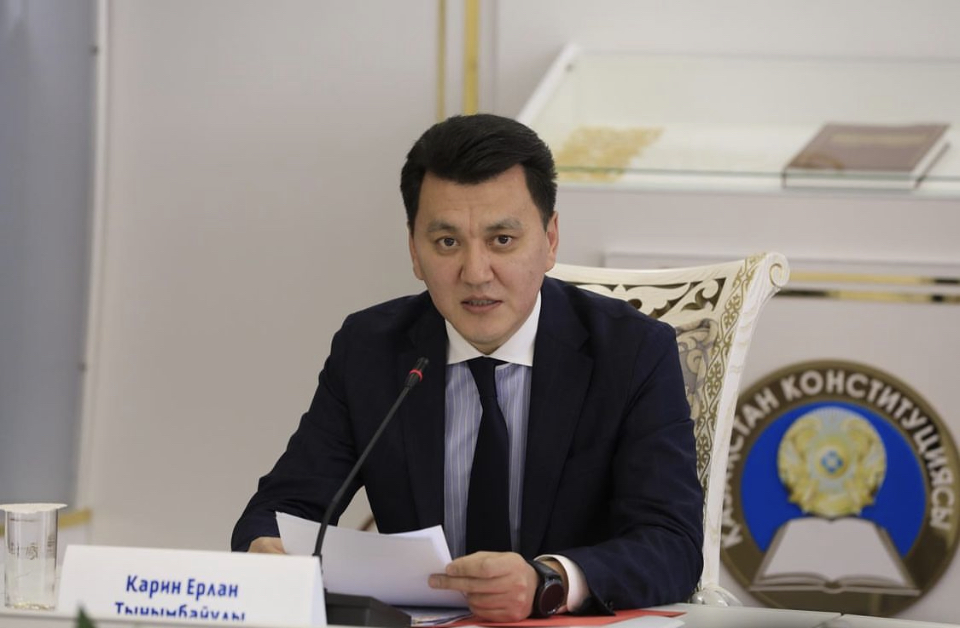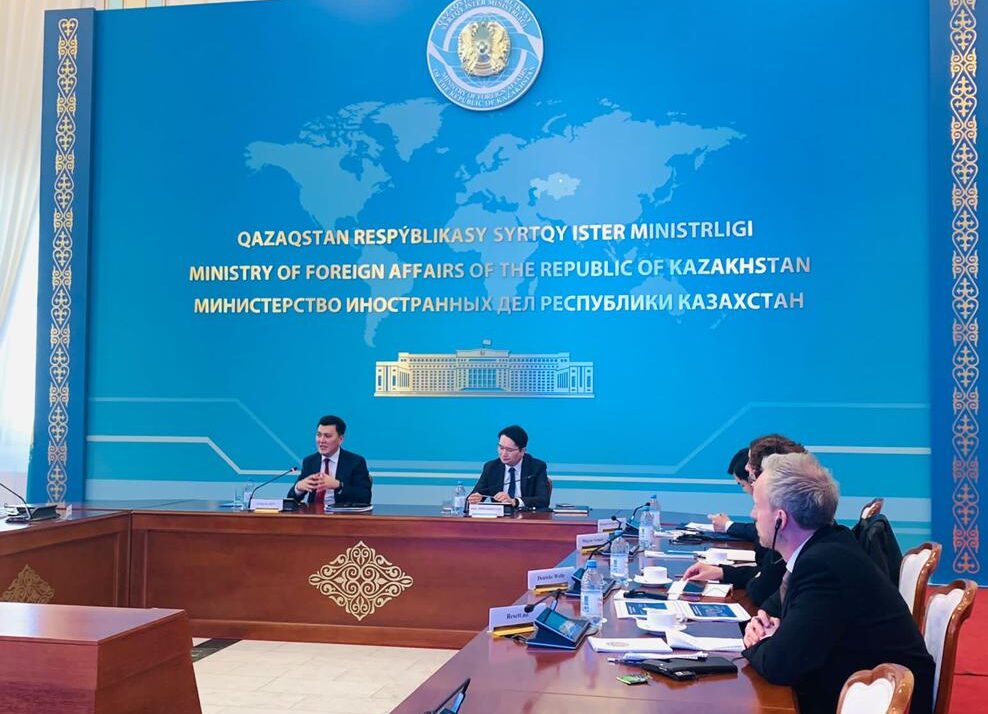
Kazakhstan’s President Kassym-Jomart Tokayev has signed a decree on holding a national referendum on June 5, 2022, on the draft amendments and additions to the country’s Constitution.
The upcoming constitutional reform is an important step in the implementation of the President’s programme of political reforms outlined in his state-of-the-nation address in March.
The draft amendments and additions to the Constitution were developed by leading legal and constitutional scholars and received a positive assessment from the Constitutional Council.
The draft constitutional amendments are based on the requests from citizens and are implemented in the interests of the entire society.
All amendments and additions to the Constitution are interrelated and form part of a single goal – to create a legal framework for:
1. The final transition from a super-presidential model to a presidential republic;
2. Redistribution of a number of powers;
3. Strengthening the role and status of Parliament;
4. Increasing the participation of the people in the country’s governance; and
5. Strengthening mechanisms for protecting citizens’ rights.
The draft Law “On Amendments and Additions to the Constitution of the Republic of Kazakhstan” was officially published in the country’s print media on May 6.
In essence, the constitutional reform will create an optimal balance of relations between the branches of government and ensure maximum equidistance of the institution of the presidency.
Its goal is increased political competition, creation of equal conditions for the development of all political parties, independence and impartiality in decision-making.
The outcome is also expected to expand the powers of local government and self-government, implemented by local representative and executive bodies responsible for the state of affairs in the relevant territory.
The draft envisages the exclusion of the President’s powers to terminate or suspend in whole or in part the acts of governors of regions, cities of national significance and the capital.
It also envisages the exclusion of the President’s power to dismiss akims (mayors) of districts, cities and rural districts.
As such, the powers of the President in relation to local authorities are reduced and concentrated on regional governors, while the role of maslikhats is significantly strengthened.

Kazakhstan’s State Secretary Erlan Karin (above) released a video on May 17 explaining the constitutional amendments and categorizing them in five key blocks. The video went online on his YouTube channel.
According to preliminary data, nearly 11.8 million people are eligible to vote in the referendum.
“Today, at the new stage of development, Kazakhstan expects a large-scale political modernization, which is impossible without the constitutional reform. Changes will affect one-third of the articles of the Constitution,” he said at the beginning of the video.
A group of scientists and legal scholars have worked on the amendments to 33 articles of the Constitution. This will be the first time the amendments will be voted through a referendum. Since Kazakhstan gained independence in 1991, four packages of amendments were introduced to the Constitution, but all of them were made through a vote in the Parliament.
“It may be difficult for many of you to immediately see the difference between the old and the new version of the Constitution. That’s why we have divided all changes and amendments into five major blocks, where each answers the main question – what will change in the updated Constitution,” said Mr Karin.
First block – transition from super-presidential model to a presidential republic
The first block addresses the final transition from a super-presidential model to a presidential republic – something that Mr Tokayev promised in his March 16 state-of-the-nation address and what he has started to implement by stepping down as the chair of the ruling Amanat party.
These amendments prohibit the President to be affiliated with any political party for the duration of his or her term of office. The same rule applies to the presidents and judges of the Constitutional Court, the Supreme Court, and other courts, the chairpersons and members of the Central Election Commission, as well as the Supreme Audit Chamber.
“The advantage of the amendment is increased political competition and the creation of equal conditions for the development of all political parties,” said Mr Karin.
This block of amendments also introduces a ban on close relatives of the President to hold positions of civil servants and heads of quasi-public sector entities and strips the right of the President to remove akims (mayors) of districts, cities, and rural districts from office.
Second block – redistributing powers
The presidential quota in the Senate, an upper chamber of the Kazakh Parliament will be reduced from 15 to 10 deputies, and five of them will be proposed by the Assembly of the People of Kazakhstan, a consultative and advisory body representing ethnic groups living in Kazakhstan.
This block also envisions the re-establishment of the Constitutional Court. It will consist of 11 judges – four more than at present. Six judges will be appointed by Parliament, four judges will be appointed by the President, and the Chairperson of the Constitutional Court will be appointed by the President with the consent of the Senate.
Third block – strengthening the role and enhancing the status of Parliament
The quota of the Assembly of the People of Kazakhstan from the Mazhilis, the lower chamber of the Parliament, is transferred to the Senate and reduced from nine deputies to five.
Deputies of the Mazhilis will be elected by a mixed electoral system: by a system of proportional representation in the territory of a single nationwide constituency, as well as in single-mandate territorial constituencies (new version of paragraph 3 of Article 50 Constitution).
The introduction of a mixed electoral system will make it possible to fully take into account the rights of all citizens and better reflect the interests of voters.
“It is proposed that the Mazhilis will adopt laws and the Senate will approve or not approve them. This will strengthen the mechanism of checks and balances in the political system,” said Karin.
Fourth block – expanding public participation in decision-making
“The most important thing is that the Constitution finally and unambiguously fixes the norm that the land and its subsoil, waters, flora, and fauna and other natural resources belong to the people. The state implements property rights on behalf of the people,” said Mr Karin.
Akims of regions (governors), cities of national status, and the capital (mayors) will be appointed to office by the President only with the consent of all deputies of maslikhats (local legislative bodies) of a given region. The President will propose at least two candidates to be voted on. The candidate with the highest number of votes will be appointed to the position.
Fifth block – strengthening the protection of the rights of citizens
The amendments will give the citizens the right to directly appeal to the Constitutional Court for a review of normative legal acts directly affecting their rights and freedoms for compliance with the Constitution.
They also finalize the country’s commitment to abolish the death penalty at the constitutional level. The Constitutional Law will also regulate the work of the Prosecutor’s Office.
“This will strengthen systemic human rights activities and supreme supervision over the observance of the rule of law in the territory of the country on behalf of the state,” said Mr Karin.
The human rights ombudsperson will also receive immunity and guarantees of independence and unaccountability to any state bodies and officials and will have the right to appeal to the Constitutional Court.
“The amendments I have listed affect the fundamental principles of the state’s work and have historic significance for Kazakhstan. These reforms are the most important stage of large-scale political modernization. Following the adoption of these amendments, more than 20 laws will have to be amended. The constitutional reform is systemic in nature improving the efficiency of the entire state model. And the effect of these changes will be felt by every citizen of Kazakhstan,” said Mr Karin.

Several experts on Constitutional Law have expressed the opinion that Kazakhstan is moving in the right direction regarding the reforms. However, Human Rights Watch said on May 19 that Kazakhstan should strengthen the parts of its constitutional reforms focused on plans for a human rights commissioner and for a Constitutional Court to reinforce human rights protection.
It said that it is concerned that the time frame for the referendum does not allow for public consultation and debate about the proposals, nor for consideration of changes to strengthen key human rights elements.
“Kazakhstan should show it is committed to human rights improvements by strengthening some of the constitutional proposals,” said Mr Hugh Williamson, Europe and Central Asia director at Human Rights Watch. “The government should also allow the time needed to open the constitutional reforms to public consultation and debate and to consider amendments before the final proposals are put to a referendum.”
On March 16, President Tokaev delivered a speech, “New Kazakhstan: The Path of Renewal and Modernization,” that signalled the constitutional changes.
A government working group published 56 proposed changes to the constitution on April 25. The national referendum is scheduled for June 5.
Human Rights Watch said the Kazakhstan government should undertake broad consultation and consider further changes before the proposals are put to a referendum. If this is not possible before June 5, it should postpone the vote until such consultation has taken place.
“A ‘New Kazakhstan’ is impossible without respect for freedoms of expression and peaceful assembly, and accountability for serious human rights violations,” Mr Williamson said. “Any constitutional changes should follow public participation and debate, and include measures to strengthen institutions that can help to ensure that everyone’s rights are guaranteed.”
Mr Lee Kwang Tae, professor at the Centre for International Area Studies, Hankuk University of Foreign Studies in South Korea, emphasised that the reforms in Kazakhstan aimed at pluralising civil society and facilitating the creation of political parties will certainly contribute to the further development of the country.
Mr Park Sang Nam, a professor at Hanshin University and President of the Korean Eurasian Society, said: “For our part, we are in every possible way ready to share the experience of South Korea in reforming the state system and strengthening the role of civil society institutions and the media in Kazakhstan.”
Mr Urazgali Selteyev, director of the Nur-Sultan-based Eurasian Integration Institute, believes the changes to the constitution in Kazakhstan will bring more openness to the political order.
“We will get an influential parliament and a generally balanced system of checks and balances between government institutions that will become more effective. It will be the first time in a long time that such a large-scale initiative is being put to a public vote,” he told Eurasianet.
Mr Yevgeny Zhovtis, a veteran rights activist and political observer, however, is wary. He welcomes the provisions intended to bolster human rights, but he questions the grand predictions about an imminent radical transition to democratic values.
He sees the reforms as more of a tactical political move than a commitment to root-and-branch transformation.
“The political reforms are not cardinal, their intent is different. And that is to demonstrate that there has been departure from super-presidential authority, from the Nazarbayev era, which people have long been awaiting, and to associate these processes with the name of Tokayev,” he told Eurasianet.












